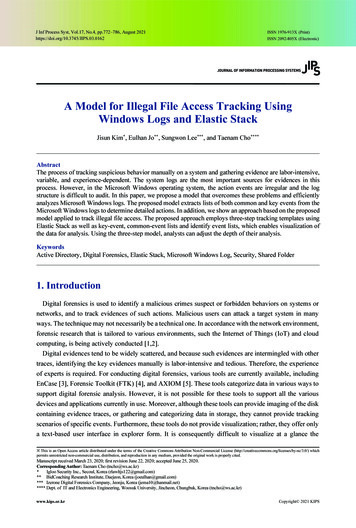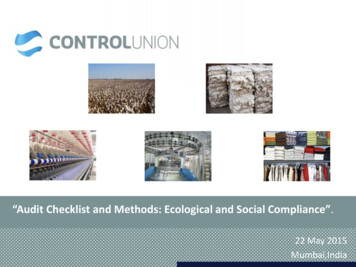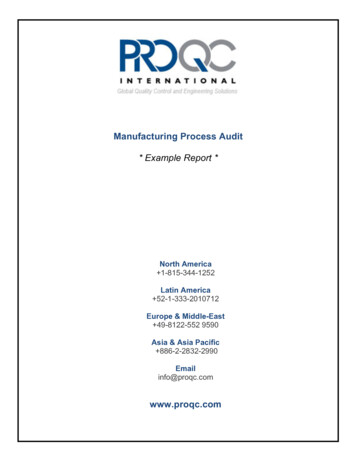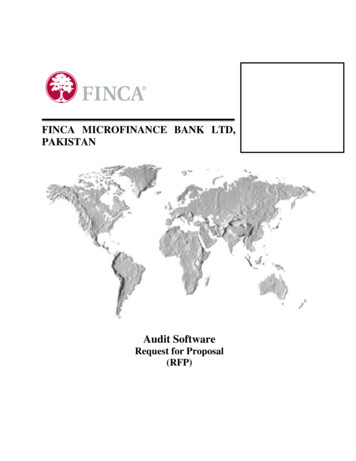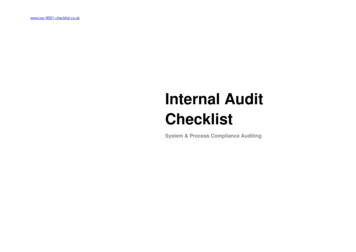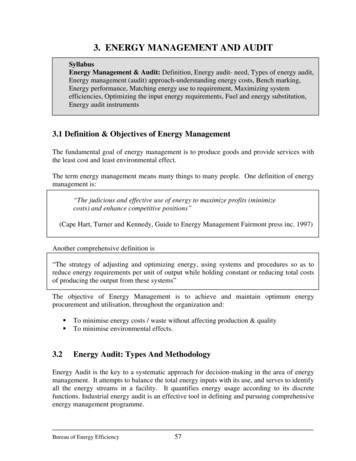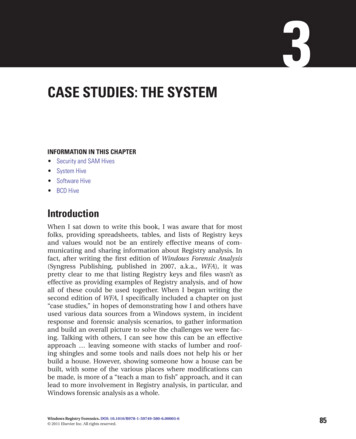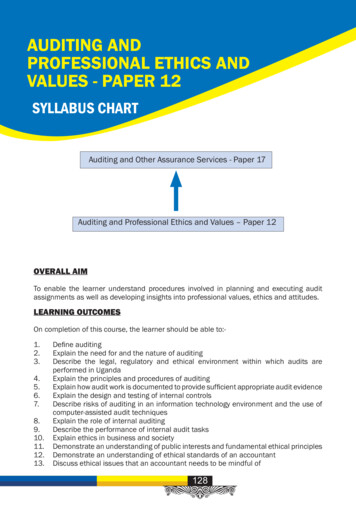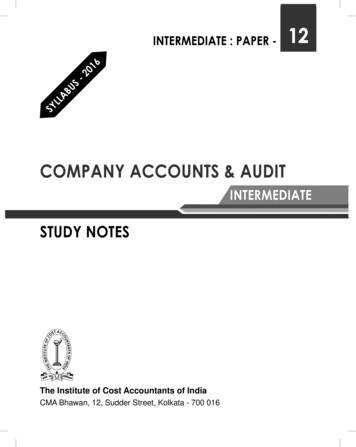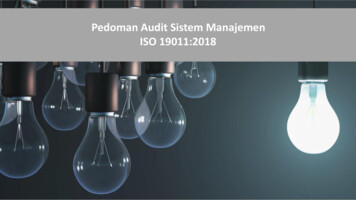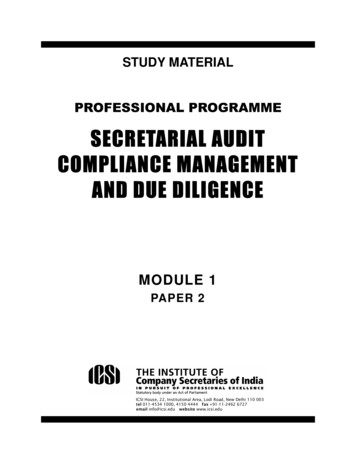
Transcription
STUDY MATERIALPROFESSIONAL PROGRAMMESECRETARIAL AUDITCOMPLIANCE MANAGEMENTAND DUE DILIGENCEMODULE 1PAPER 2ICSI House, 22, Institutional Area, Lodi Road, New Delhi 110 003tel 011-4534 1000, 4150 4444 fax 91-11-2462 6727email info@icsi.edu website www.icsi.edu
THE INSTITUTE OF COMPANY SECRETARIES OF INDIATIMING OF HEADQUARTERSMonday to FridayOffice Timings – 9.00 A.M. to 5.30 P.M.Public Dealing TimingsWithout financial transactions – 9.30 A.M. to 5.00 P.M.With financial transactions – 9.30 A.M. to 4.00 P.M.Phones41504444, fo@icsi.eduLaser Typesetting by DELHI COMPUTER SERVICES, Dwarka, New DelhiPrinted at M.P. PRINTERS/JULY, 2017
PROFESSIONAL PROGRAMMESECRETARIAL AUDIT, COMPLIANCE MANAGEMENT AND DUE DILIGENCEDue diligence is an investigative process for providing the desired comfort level about the potentialinvestment and to minimize the risks such as hidden uncovered liabilities, poor growth prospects, priceclaimed for proposed investment being on higher side etc., In general due diligence process istransaction based.Secretarial Audit is a process to check compliance with the provisions of various laws and rules/regulations/procedures, maintenance of books, records etc., by an independent professional to ensurethat the company has complied with the legal and procedural requirements and also followed the dueprocess. It is essentially a mechanism to monitor compliance with the requirements of stated laws.Compliance management is the method by which corporate manage the entire compliance process. Itincludes the compliance program, compliance audit, compliance report etc. and in other words it iscalled compliance solution. Secretarial Audit and Compliance management are the routine tools foreffective governance. Compliance management is to be in built into the corporate system to avoid noncompliances and the Secretarial audit is carried out on periodical basis by an independentprofessional. Due diligence is a pre-emptive tool to assess a business transaction.The study material is based on those sections of the Companies Act, 2013 and the rules made thereunder which have been notified by the Government of India and came into force w.e.f. April 01, 2014(including Amendments/clarifications/circulars issued there under upto December, 2016). In respect ofsections of The Companies Act, 2013 which have not been notified, applicable sections of CompaniesAct, 1956 have been dealt with in the study.Company Secretaryship being a professional course, the examination standards are set very high,with emphasis on knowledge of concepts, applications, procedures and case laws, for which solereliance on the contents of the study material may not be enough. Besides Company SecretariesRegulations, 1982 requires the students to be conversant with the amendments to the laws made uptosix months preceding the date of examination. This study material may therefore be regarded as basicmaterial and must be read along with the notified provisions of Companies Act, 2013 and rules madethereunder and the provisions of Companies Act 1956 which is still in force.The amendments made upto June 2017 have been incorporated in this study material. However, itmay happen that some developments might have taken place during the printing of the study materialand its supply to the students. The students are therefore advised to refer to the e-bulletin 'StudentCompany Secretary' and ICSI Journal Chartered Secretary and other publications for updation ofstudy material. In the event of any doubt, students may contact the Directorate ofAcademics at academics@icsi.edu.Although due care has been taken in publishing this study material yet the possibility of errors,omissions and/or discrepancies cannot be ruled out. This publication is released with anunderstanding that the Institute shall not be responsible for any errors, omissions and/or discrepanciesor any action taken in that behalf.Should there be any discrepancy, error or omission noted in the study material, the Institute shall beobliged if the same are brought to its notice for issue of corrigendum in the e-bulletin 'StudentCompany Secretary'.
(iv)PROFESSIONAL PROGRAMMESYLLABUSFORMODULE 1 - PAPER 1: SECRETARIAL AUDIT, COMPLIANCE MANAGEMENTAND DUE DILIGENCE (100 MARKS)Level of Knowledge: Expert KnowledgeObjective:(i) To acquire thorough understanding of Secretarial Audit and Corporate Compliance Management.(ii) To acquire understanding of the due diligence of various business transactions.Detailed Contents:PART A: Secretarial Audit (25 Marks)1. Secretarial Standards Concept, Scope and Advantages Secretarial Standards issued by the ICSI Compliance of Secretarial Standards for Good Governance Relevance of Guidance Note(s)2. Secretarial Audit Need, Objective and Scope Periodicity and Format for Secretarial Audit Report Benefits of Secretarial Audit Professional Responsibilities and Penalties3. Checklist for Secretarial AuditPart B: Due Diligence and Compliance Management (75 Marks)4. Due Diligence - An Overview Introduction, Nature, Need and its Significance Objectives, Scope and Types of Due Diligence Process of Due Diligence Concept of Data Room in Due Diligence Due Diligence vs. Audit5. Issue of Securities Introduction and Regulatory Framework Pre and Post Issue Due Diligence - IPO/FPO Due Diligence - Preferential Issues of Listed and Unlisted Companies Employee Stock Option, Bonus Issue, Rights Issue, Debt Issues
(v) Issue of Securities by SMEs Role of Company Secretary in Issue of Securities6. Depository Receipts Due Diligence Introduction; Broad Regulatory Framework; Parties, Approvals, Documentation and Process Issue of ADRs, GDRs, IDRs and FCCBs7. Merger & Acquisition (M&A) Due Diligence Introduction Stages of M&A Due Diligence Data Room Management Business, Financial, Legal and Corporate Governance Due Diligence HR and Cultural Due Diligence Impact of Due Diligence on Valuation Takeovers and Acquisitions Due Diligence8. Competition Law Due Diligence Introduction Need for Competition Compliance Programme Mergers & Acquisitions and Competition Law Aspects Reasons for Due Diligence of Competition Law Aspects Process of Due Diligence of Competition Law Aspects Due Diligence of Various Agreements Some Common Anti Competitive Practices Due Diligence on Abuse of Dominance Due Diligence Checklist for Compliance with Competition Act, 2002 Checklist for Anti Competitive Agreements/Abuse of Dominant Position/Regulation ofCombinations9. Legal Due Diligence Introduction Objectives, Scope, Need and Process General Documents/Aspects to be covered Possible Hurdles in Carrying out a Legal Due Diligence and Remedial Actions10. Due Diligence for Banks Introduction Need for Due Diligence for Banks Process of Due Diligence for Banks Due Diligence Report to Banks
(vi)11. Environmental Due Diligence Introduction Need for Environmental Due Diligence Process involved in Environmental Due Diligence Regulatory Framework relating to Environment Check List on Major Regulatory Compliances Environmental Guidelines for Industries by Ministry of Environment Environmental Impact Assessment Environmental Management Plan Preparation of Risk Analysis Matrix Identification of Potential Issues Impact Analysis Suggestions and Mitigation Measures12. Search and Status Reports Importance and Scope Verification of Documents relating to Charges Requirements of Financial Institutions and Corporate Lenders Preparation of Report13. Compliance Management Concept and Significance Establishment of Compliance Management System Absolute, Apparent and Adequate Compliance
(vii)LIST OF RECOMMENDED BOOKSMODULE IPAPER 2 : SECRETARIAL AUDIT, COMPLIANCE MANAGEMENT ANDDUE DILIGENCERecommended Readings and References:1.Taxmann:SEBI Manual2.Mamta Bhargava:Compliances and Procedures under SEBI Law, Shreeji Publishers,8/294, Sunder Vihar, New Delhi – 1100873.ICSI:Handbook on Mergers Amalgamations and takeovers.4.Snow white:Mergers/Amalgamations, takeovers, Joint Ventures, LLPs andCorporate Restructure by K R Sampath5.Butterworths:Mergers et al by S Ramanujam6.The Art of M&A DueDiligence:Alexandra Reed Lajoux & Charles M. Elson7.Regulations/Rules/Guidelines/Circulars issued by SEBI, RBI, MCA etc from time to time.8.Bare Acts9.SEBI (Listing obligations and Disclosure Requirements) Regulations, 2015.10.Guidance Note on Diligence Report for Banks (ICSI Publication)11.Referencer on Secretarial Audit (ICSI Publication)12.Important Websites(a) www.sebi.gov.in(b) www.rbi.org.in(c) www.finmin.nic.in(d) www.dipp.nic.in(e) www.mca.gov.inJournals:1.Chartered Secretary:ICSI, New Delhi2.Student CompanySecretary:ICSI, New Delhi3.Corporate Law Adviser:Vishaman Publisher (P) Ltd.4.SEBI and CorporateLaws:TaxmannNote:(i) Students are advised to read the relevant Bare Acts, Regulations/circulars/rules issued by variousregulatory authorities like SEBI, RBI, MCA etc from time to time in addition to reading of journelslike Student Company Secretary, Chartered Secretary etc.(ii) The reference to websites of different regulatory authorities is essential.
(viii)ARRANGEMENT OF STUDY LESSONSPAPER 1: SECRETARIAL AUDIT, COMPLIANCE MANAGEMENT ANDDUE DILIGENCE (100 Marks)Lesson No.SubjectPART A1Secretarial Audit and Secretarial Standards – An Overview2.Check Lists for Secretarial AuditPART B3.Due Diligence – An Overview4.Issue of Securities5.Depository Receipts Due Diligence6.Due Diligence – Mergers & Amalgamations7.Competition Law Due Diligence8.Legal Due Diligence9.Due Diligence for Banks10.Environmental Due Diligence11.Search & Status Report12.Compliance Management
(ix)PROFESSIONAL PROGRAMMESECRETARIAL AUDIT, COMPLIANCE MANAGEMENT AND DUE DILIGENCECONTENTSPageLesson 1SECRETARIAL AUDIT AND SECRETARIAL STANDARDS – AN OVERVIEWLearning objectivesIntroductionThe objectives of Secretarial AuditScope of Secretarial AuditNeed for Secretarial AuditSecretarial Audit & Company Secretary in Practice (PCS)Benefits and beneficiaries of Secretarial AuditSecretarial StandardsScope of Secretarial StandardsProcedure for issuing Secretarial StandardsNeed for Secretarial StandardsCompliance of Secretarial Standards for good governanceSecretarial Standards and the Companies Act, 2013Secretarial Audit ReportLesson Round UpSelf Test Questions 1222558101312141414272930 3132323233353839414748495051525354Lesson 2CHECKLIST- SECRETARIAL AUDITLearning ObjectivesIntroductionChecklist under the Companies Act, 2013General Compliance RequirementsMemorandum and/or Articles of AssociationDisclosuresIssue of shares and other securitiesPreferential issue u/s 62Employee Stock Option under Companies Act, 2013 and Rules made thereunderDebenturesIssue and redemption of preference sharesTransfer and transmission of shares and other securities and related mattersDepositsChargesMinutes Book of Meetings of DirectorsDividendCorporate Social Responsibility (CSR)
(x)PageDirectors and Key Managerial Personnel (“KMP”)Loans to Directors etc. and Related Party Transactions (section 185 & 188)Loans, investments, guarantees and securities (Section 186)Registers, filing of Forms, return and documentsRegistration of resolutions and agreementsChecklist- FEMA RegulationsForeign Direct InvestmentChecklist on Foreign Direct Investment under Automatic RouteForeign Direct Investment under Approval RouteDirect Investment by Residents in Joint Venture/ Wholly owned subsidiary abroadDirect Investment outside India – Automatic RouteExternal Commercial BorrowingsLesson Round UpSelf Test Questions 5558606166717172737375757878. 798080808182848989909191929393939697Learning ObjectivesIntroduction and Regulatory Framework.99100Securities and Exchange Board of India (Issue of Capital and DisclosureRequirements) Regulations, 2009 [(SEBI(ICDR) Regulations].101Lesson 3DUE DILIGENCE — AN OVERVIEWLearning ObjectivesIntroductionWhy Due Diligence?Objectives of Due DiligenceScope of Due DiligenceTypes of Due DiligenceFactors to Be Kept in Mind While Conducting Due DiligenceDocuments to be Checked in Due Diligence ProcessThe Concept of Data Room in Due DiligenceData Room – Virtual or PhysicalMajor Advantages of Virtual Data RoomSome Disadvantages of Virtual Data RoomVirtual and Physical Data Room – A comparisonData room administration and data securityDue Diligence vs AuditNon Disclosure AgreementLesson Round UpSelf Test QuestionsLesson 4ISSUE OF SECURITIES
(xi)PageII. Due Diligence - Initial Public Offer (IPO)/Further Public Offer (FPO)A check list on Major IPO Compliances under SEBI (ICDR) Regulations 2009Role of Company Secretary in an IPOIII. Due Diligence – Issues other than IPO/FPOIII-A. Due Diligence – Preferential IssueIII-B. Due Diligence – Employee Stock OptionIII-C. Due Diligence- Bonus IssueIII-D. Due Diligence – Right IssueIV. Due Diligence- Qualified Institutional PlacementV. Due Diligence-Institutional Placement ProgrammeIssue of Securities by Small And Medium EnterprisesSME Exchanges in IndiaRegulatory Framework for Listed SMEsMarket making compulsory for listed SMEsModel listing agreement for SMEsDebt SecuritiesRegulatory Framework for Debt SecuritiesA. Compliance Check List under SEBI (ICDR) Regulations 2009B. SEBI (Issue and Listing of Debt Securities) Regulations, 2008 (Complianceswith respect to Non-Convertible Debt Instruments)C. SEBI (Public Offer and Listing of Securitised Debt Instruments) Regulations 2008Lesson Round UpSelf Test Questions. 45145. 148150151151.153154154155. 158161168170170179184185195196Lesson 5DEPOSITORY RECEIPTS DUE DILIGENCELearning ObjectivesGlobal Depository ReceiptsI. IntroductionII. Types of Depository ReceiptsIII. Broad Regulatory Framework within and outside India on Issue ofDepository ReceiptsIV. Parties, Approvals, Documentation and Process Involved in the Issue of GDRsChecklist under Companies (Issue of Global Depository Receipts) Rules, 2014Indian Depository ReceiptsRule 13 of Companies (Registration of Foreign Companies) Rules, 2014Rights Issue of Indian Depository Receipts-Salient FeaturesPenal Provisions Relating to IDRs under Various LegislationsAnnexuresLesson Round UpSelf Test Questions
(xii)PageLesson 6DUE DILIGENCE –MERGERS AND AMALGAMATIONSLearning ObjectivesIntroductionDue Diligence Process in the M&A StrategyActivity Schedule for Planning a MergerPreparation of Scheme of AmalgamationImpact of Due Diligence on ValuationData Room Management in Strategic DecisionsHR and Cultural Due Diligence in Business TransactionsCultural Due DiligenceScope of Cultural Due DiligenceCorporate Governance Due DiligenceFactors Influencing Quality of Corporate GovernanceTakeover Due DiligencePublic Announcement (PA)Contents of Public announcement (Regulation 15)Filing Draft Letter of OfferOffer PricePayment of Consideration (Regulation 21)Directors of the Target Company (Regulation 24)Obligation of target companyObligation of the acquirerObligation of the manager to the open offer (Regulation 27)Consequences of Violation of obligations SEBI (SAST) Regulations, 2011Lesson Round UpSelf Test Questions. . . 236Lesson 7COMPETITION LAW DUE DILIGENCELearning ObjectivesIntroductionNeed for compliance of Competition LawWhy Comply?Competition Act, 2002 – A Bird’s Eye ViewAnti-competitive agreements (Section 3)Anti Competitive Agreements are void [Section 3(2)]Horizontal Agreements [Section 3(3)]Vertical Agreements [Section 3(4)]
(xiii)PageAbuse of Dominance (Section 4)Regulation of Combinations. (Section 5)Due Diligence of Competition Law AspectsDue Diligence Checklist for Compliance with Competition Act, 2002I Checklist for Anti Competitive AgreementsII Checklist for Abuse of Dominant PositionIII Checklist for Regulation of CombinationsCombination NoticeProcedure for Investigation of CombinationsNeed for Competition Compliance ProgrammeLesson Round UpSelf Test Questions. . 239242245246246248249252253255257257. 71274274274274274275Lesson 8LEGAL DUE DILIGENCELearning ObjectivesI. IntroductionII. Objectives of Legal Due DiligenceIII. Scope of Legal Due DiligenceIV. Need of Legal Due DiligenceV. Legal Due Diligence ProcessVI. General Documents/Aspects to Be CoveredVII. Possible Hurdles in Carrying out a Legal Due Diligence and Remedial ActionsVIII. Role of Company Secretaries in Legal Due DiligenceLesson Round UpSelf Test QuestionsLesson 9DUE DILIGENCE FOR BANKSLearning ObjectivesIntroductionBackgroundNeed for Diligence ReportScope of Diligence ReportFormat of Diligence ReportGuidance on Diligence ReportingPeriod of ReportingSecretary in Whole-Time PracticeRight to access Records and Methodology for Diligence ReportingReporting with QualificationProfessional Responsibility and Penalty for False Diligence Report
(xiv)PageOther compliancesSpecimen sanction letterLesson Round UpSelf Test Questions 276287312313.315316317317318319.319.321. 323325327328329331332333333. 335336336337342344344344345345345346Lesson 10ENVIRONMENTAL DUE DILIGENCELearning ObjectivesIntroductionWhy Environmental Due diligence?Process involved in Environmental Due diligenceRegulatory Framework relating to environmentChecklist on Major CompliancesThe Environment (Protection) Act, 1986 (Read With The Environment (ProtectionRules, 1986)The Water (Prevention & Control of Pollution) Act, 1974 [Read With Water(Prevention & Control Of Pollution) Rules, 1975]The Air (Prevention & Control of Pollution) Act, 1981 [Read With The Air(Prevention & Control Of Pollution) Rules, 1982]Environmental Guidelines for Industries by Ministry of EnvironmentEnvironmental Impact Assessment (EIA)ISO standards for Environment.Environmental Management Plan (EMP) for commissioning of projectsPreparing a Risk Analysis MatrixEnvironmental Management as a Tool- For Value CreationLesson Round UpSelf Test QuestionsLesson 11SEARCH/STATUS REPORTSLearning ObjectivesIntroductionScope and ImportanceSearch/Status ReportLegal ProvisionsRequirements of Various Financial Institutions and other Corporate LendersCertification by Company Secretaries in PracticeNecessary Powers of a company its Directors to Enter into an agreementBorrowing Limits and Compliance of section 180 (1) (c)Compliance for borrowing moneyLesson Round UpSelf Test Questions
(xv)Lesson 12COMPLAINCE MANAGEMENTLearning ObjectivesIntroductionNeed for ComplianceRisk of Non-ComplianceSignificance of Corporate Compliance ManagementScope of Corporate Compliance ManagementEstablishment of Compliance Management FrameworkRole of Information Technology in Compliance Management Systems ThroughWeb Based Compliance SystemsThe Systems Approach to Compliance ManagementCompliance SolutionsApparent, Adequate and Absolute CompliancesSecretarial Audit and Compliance Management SystemRole of Company Secretaries in Compliance ManagementLesson Round UpSelf Test Questions.347348348349349349352. 353353354355356356363364 366TEST PAPERTest Paper
Lesson 1Secretarial Audit and SecretarialStandard– An OverviewLESSON OUTLINELEARNING OBJECTIVESTimely examination of compliance reduces risks aswell as potential cost of non-compliance and alsobuilds better corporate image. Secretarial Audit Secretarial Audit – Concept Objective, Scope of Secretarial Audit Benefits and Beneficiariesestablishes better compliance platform by checkingthe compliances with the provisions of various Secretarial Audit process tions/ remedies. The primary objectiveof the Compliance Management backed Secretarial Secretarial Standards – Concept SecretarialStandardsCompanies Act, 2013under Secretarial Audit Report – Formatstatutes, laws, rules & regulations, procedures by aPracticing Company Secretary to make necessarytheAudit is to safeguard the interest of the Directors &officers of the companies, shareholders, creditors,employees, customers etc. With the introduction ofconcept of 'Secretarial Audit' in CorporateGovernance Voluntary Guidelines (CGVG) issued byMinistry of Corporate Affairs in 2009 and mandatedby the 'Companies Act 2013, it has gained immenseimportance.After reading this lesson, the students would be ableto understand the need, objectives, scope, benefitsof secretarial audit, professional responsibilities andpenalties etc.
2PP-SACM & DDINTRODUCTIONMCA Corporate Governance Voluntary Guidelines, 2009 provided for conducting Voluntary Secretarial Auditby the Companies as under:“Since the Board has the overarching responsibility of ensuring transparent, ethical and responsiblegovernance of the company, it is important that the Board processes and compliance mechanisms of thecompany are robust. To ensure this, the companies may get the Secretarial Audit conducted by a competentprofessional. The Board should give its comments on the Secretarial Audit in its report to the shareholders.”Section 204 of the Companies Act, 2013 provides for mandatory secretarial audit for every listed companyand companies belonging to other prescribed class of companies.Such companies are required to annex a secretarial audit report with its Board’s report.As per rule 9 of the Companies (Appointment and Remuneration of Managerial Personnel) Rules, 2014, theprescribed class of companies is as under:(a) every public company having a paid-up share capital of fifty crore rupees or more; or(b) every public company having a turnover of two hundred fifty crore rupees or more.Secretarial Audit is also applicable to a private company which is a subsidiary of a public company, andwhich falls under the prescribed class of companies as indicated above. The companies which are notcovered under section 204 may obtain Secretarial Audit Report voluntarily as it provides an independentassurance of the compliances of applicable laws of the company.Company secretary in practice has been exclusively recognised for conducting secretarial audit. The section204 further provides that Secretarial Audit Report is to be submitted in a format prescribed under rules. Asper sub-rule (2) of Rule 9 of the Companies (Appointment and Remuneration of Managerial Personnel)Rules, 2014, the format of the Secretarial Audit Report shall be in Form MR-3 (Annexure-A).Section 134 and Sub-section (3) of Section 204 provides that the Board of Directors, in its report, shallexplain in full any qualification or observation or other remarks made by the company secretary in practice inthe secretarial audit report.The Objectives of Secretarial AuditThe objectives of Secretarial Audit may be summarized as under. To check & report on compliances of applicable laws and Secretarial Standards To point out non-compliances and inadequate compliances To protect the interest of various stakeholders i.e. the customers, employees, society etc. To avoid any unwarranted legal actions/penalties by law enforcing agencies and other persons aswell.Scope of Secretarial AuditThe scope of Secretarial Audit comprises verification of the compliances under the following enactments,
Lesson 1Secretarial Audit – An Overview 3rules, regulations, notifications and guidelines:(i) The Companies Act, 2013 (the Act) and the Rules made thereunder:The Act is divided into 29 Chapters, 470 Sections and VII Schedules. On various matters, CentralGovernment has been empowered to make rules. A perusal of the scheme of the Act makes it clear thatcompliances under the Act may be divided into two categories. Compliances of the first type are annual andnon-event based such as filing of the annual return, annual report including secretarial audit report, whereverapplicable, etc. The compliances of second category are event based i.e. on happening of certain event.These events require compliance of various provisions of the Act.While secretarial audit envisages the verification of all secretarial records of a company. For ease ofpresentation, the following key areas have been highlighted for verification:Under Companies Act, 20131. Maintenance of registers and records2. Filing of forms, returns and documents3. Memorandum and/or Articles of Association4. Meetings of directors/committees thereof, shareholders and other stakeholders5. Secretarial Standards6. Directors and Key Managerial Personnel (“KMP”)7. Disclosures8. Issue of shares and other securities9. Transfer and transmission of shares and other securities and related matters10. Dividend11. Deposits12. Borrowings13. Loans, investments, guaranties and securities14.Loans to directors etc. and Related party transactions15. Charges16. Corporate Social responsibility(ii) Other major Acts and Regulations:a. The Securities Contracts (Regulation) Act, 1956 and the Rules made under that Act; (whereapplicable): With special reference to listing, delisting and continuous listing of any of the securities.b. The Depositories Act, 1996 and the Regulations and Bye-laws framed under that Act; (whereapplicable)c. The Foreign Exchange Management Act, 1999 and the Rules and Regulations made thereunder tothe extent of Foreign Direct Investment, Overseas Direct Investment and External CommercialBorrowings; (where applicable)d. The regulations and guidelines made under the Securities and Exchange Board of India Act, 1992(where applicable). The various laws/regulations/guidelines which could be considered under this
4PP-SACM & DDare:(i) The Securities and Exchange Board of India (Substantial Acquisition of Shares and Takeovers)Regulations, 2011;(ii) The Securities and Exchange Board of India (Prohibition of Insider Trading) Regulations, 2015;(iii) The Securities and Exchange Board of India (Issue of Capital and Disclosure Requirements)Regulations, 2009;(iv) The Securities and Exchange Board of India (Share Based Employee Benefit) Regulations,2014;(v)The Securities and Exchange Board of India (Issue and Listing of Debt Securities) Regulations,2008;(vi) The Securities and Exchange Board of India (Registrars to an Issue and Share TransferAgents) Regulations, 1993 regarding the Companies Act and dealing with client;(vii) The Securities and Exchange Board of India (Delisting of Equity Shares) Regulations, 2009;(viii) The Securities and Exchange Board of India (Buyback of Securities) Regulations, 1998;(ix) SEBI (Listing Obligations and Disclosures Requirements) Regulations, 2015 (where applicable).(iii) Other Applicable Laws include:Reporting on compliance of ‘Other laws as may be applicable specifically to the company’ shall mean all thelaws which are applicable to specific industry for example for Banks- all laws applicable to Banking Industry;for insurance company-all laws applicable to insurance industry; likewise for a company in petroleum sectorall laws applicable to petroleum industry; similarly for companies in pharmaceutical sector, cement industryetc.The Secretarial Auditor should prepare a list of specific laws as applicable to the company whose secretarialaudit is being conducted and verify compliance with the same. SS-1 requires every company to specify list oflaws applicable specifically to the company at its Board Meeting.Examining and reporting whether the adequate systems and processes are in place to monitor and ensurecompliance with general laws like labour laws, competition law, and environmental laws.The provisions relating to audit of accounts and financial statement of a company is dealt in the StatutoryAudit, and that relating to taxation is dealt in Tax Audit, the Secretarial Auditor may rely on the reports givenby statutory auditors or other designated professionals. However, Secretarial Auditor is expected to report onthe Secretarial Compliance of these laws.(iv) to examine and report on the compliance with Secretarial Standards issued by ICSI.(v) Adherence to board process and compliance mechanismThe scope of Secretarial Audit should include the assessment of the adequacy and quality of board processand compliance mechanism. In preparing the Audit Report, the secretarial auditor shall consider the followingmatters (illustrative):1. Instances of non-compliance during the defined audit period, in relation to the statutes, rules,regulations, etc. applicable to the company, continuing non-compliance, if any, and the reasonsthereof;
Lesson 1Secretarial Audit – An Overview 52. Significant litigation(s) initiated by the company or filed against the company with brief details of thecases;3. (a) Board structure –(i) Composition of the Board(ii) Is there a stated process to ascertain the suitability of directors?(iii) Is there a stated process in place for succession planning?(b) Deficiencies in the Board systems and processes (i) In convening meetings.(ii) In the circulation of agenda (whether the agenda is made available to the Board along withsupporting papers/presentations sufficiently in advance of the meetings).(iii) In conducting the meetings (frequency and length).(iv) In the decision making process of the Board.(v) Adequacy and integrity of minutes recorded.(vi) In the functioning of Board constituted Committees.4. The existence and adequacy of internal control systems, procedures and processes, commensuratewith the size of the company and the nature of its business, for ensuring compliance with lawsapplicable to the company;5. Any material event(s) that have happened, after the end of the financial year but before the date ofthe report, having a significant impact on any of the above reported items.6. Whether any ev
Periodicity and Format for Secretarial Audit Report Benefits of Secretarial Audit Professional Responsibilities and Penalties 3. Checklist for Secretarial Audit Part B: Due Diligence and Compliance Management (75 Marks) 4. Due Diligence - An Overview Introduction, Nature, Need and its Significance
